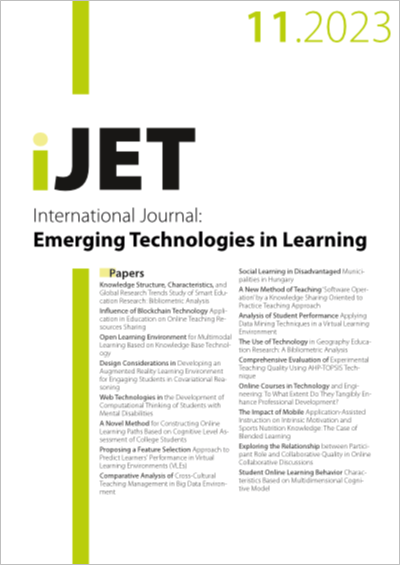Comprehensive Evaluation of Experimental Teaching Quality Using AHP-TOPSIS Technique
DOI:
https://doi.org/10.3991/ijet.v18i11.40185Keywords:
AHP-TOPSIS, university experiment, experimental teaching, teaching quality, comprehensive evaluationAbstract
The key of university experimental teaching is to help students gradually perfect from knowledge learning to improvement of actual operational ability through experiments in the teaching and learning process. University experimental teaching is conducive for promoting innovative thinking and ability of practice of university students, and it plays an important role in the entire talent training system. Establishing scientific and reasonable evaluation methods and reflecting shortages in practical experimental teaching are not only keys of evaluation but also important guarantee to improve university experimental teaching quality. In this study, an evaluation index system of experimental teaching quality was constructed by combining analytic hierarchy process (AHP) and technique for order preference by similarity to ideal solution (TOPSIS). Weights of indexes were determined. Moreover, a case study based on a comprehensive evaluation of experimental teaching quality of Construction Engineering CAD for civil engineering majors of undergraduates was performed. Results demonstrated that Level 2 indexes about teachers’ good preparation of lessons and complete and standard teaching documents (X-1-3), as well as students’ active thinking and positive participation in classroom learning (X-3-2), had the highest weight. Students’ evaluation ranking results provided quantitative references to more scientific evaluation of experimental teaching. The comprehensive evaluation of experimental teaching quality using AHP-TOPSIS technique solves the mutual dependence and feedback relationship among evaluation indexes effectively, and avoids influences of subjectivity and one-sidedness of artificial weighting. Research conclusions can provide important references to optimize experimental teaching process, train the innovation ability of students, increase the comprehensive quality of students, and deepen reform in experimental teaching.
Downloads
Published
How to Cite
Issue
Section
License
Copyright (c) 2023 Yongqi Wang

This work is licensed under a Creative Commons Attribution 4.0 International License.


